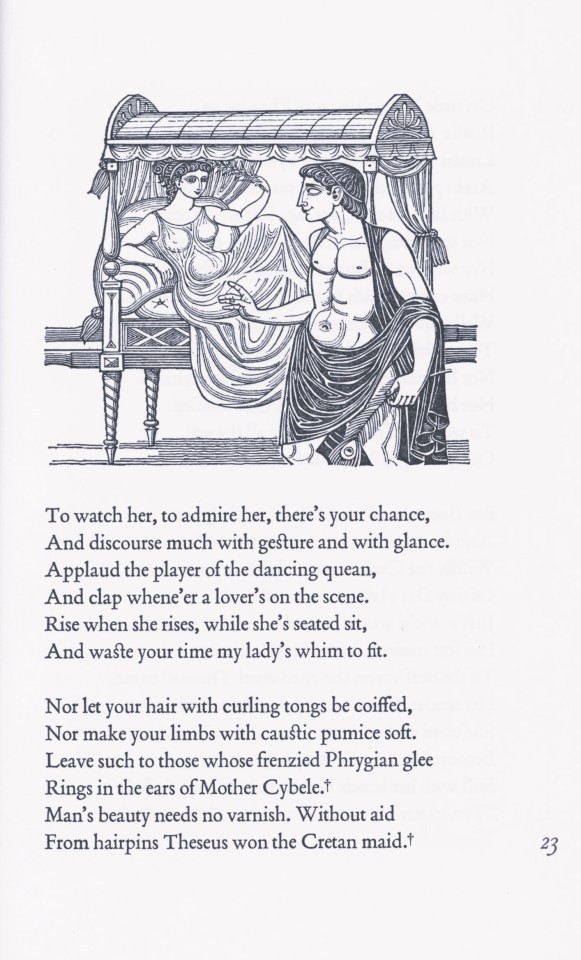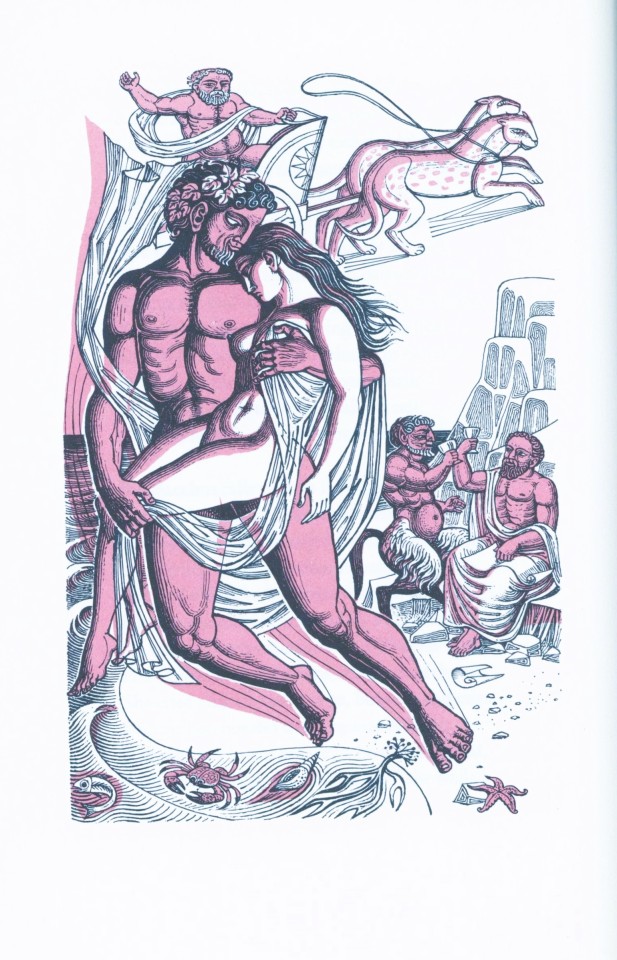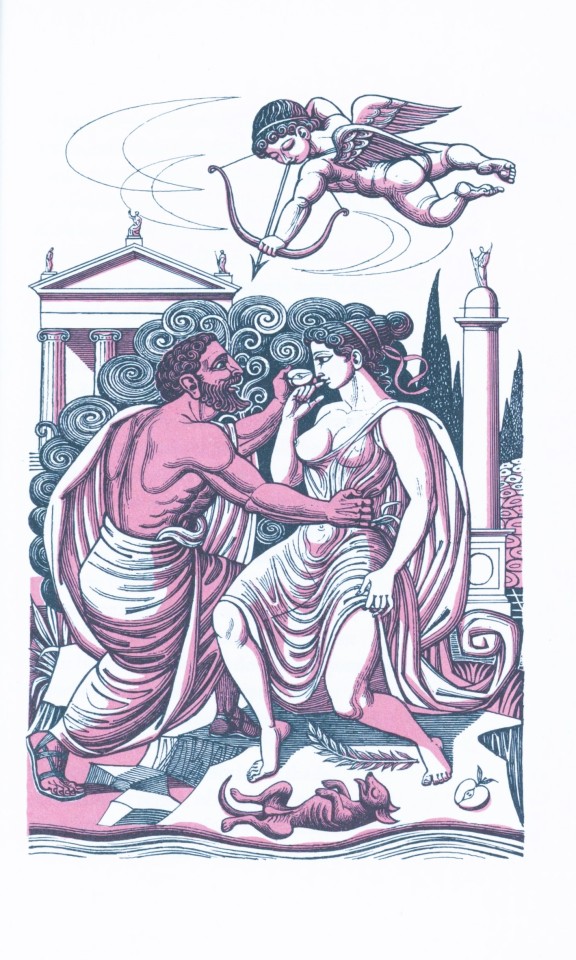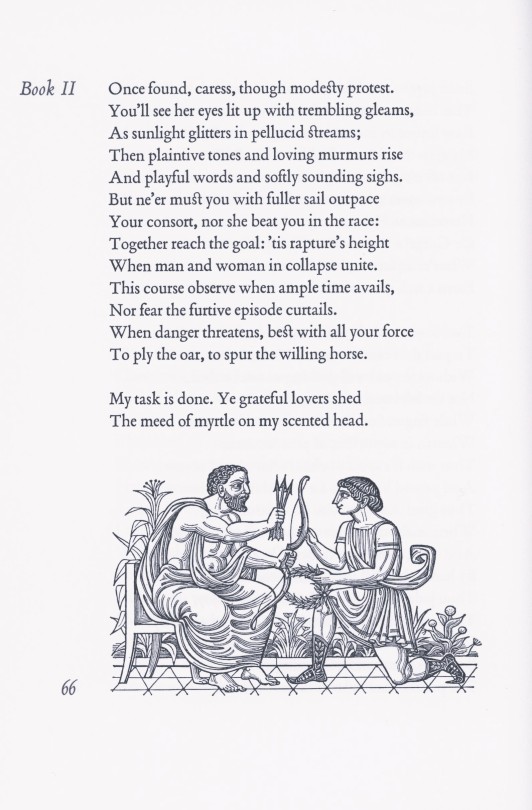#Ars amatoria
Text

L'incanto e
l'inferno.
123 notes
·
View notes
Text











Classic Lessons in Love
Publius Ovidius Naso (43 BC-AD 17/18), more familiarly known as Ovid, was a Roman poet most famously known for his mythological history of the world, Metamorphoses. His satirical and sometimes dark take on all the intricacies of love and relationships is exhibited in Ars Amatoria. The Art of Love is a 1971 English translation edition of Ars Amatoria, translated by English classicist and scholar of Latin poetry B. P. Moore (1877-1955), with pen and ink illustrations by British artist Eric Fraser (1902-1983). The edition was designed by Robert L. Dothard and printed at the Press of A. Colish in Mount Vernon, NY, for members of the Limited Editions Club in an edition of 1500 copies on specially-made, oyster-white, mould-made paper crafted at the Arches mill in France.
In the first book of Ars Amatoria, Ovid guides men on how to successfully find a woman. In the second book, we see Ovid's advice shift towards maintaining a healthy relationship with one's partner. The third and final book, produced two years after the first two, focuses on advice for women on how to win and keep the love of a man. The work, however, was considered salacious and was banned by Emperor Augustus, with the charge of it being immoral, and is one of the few examples of the Roman government censoring a Roman author’s writing.
The topic's typical scenarios are presented engagingly, incorporating elements from Greek mythology, daily life in ancient Rome, and universal human experiences. Ovid offers hilarious advice, such as how women can keep their lovers from becoming neglectful by making them artificially jealous. He also advises men to never argue with their mistresses, as it could lead to expensive gift-giving in order to reconcile. When it comes to the sexes, it seems some things never change!
-Melissa, Special Collections Classics Intern
View other Classics posts.
View more posts from the Limited Editions Club.
#classics#ovid#love#lovers#Ars Amatoria#art of love#poetry#classical literature#roman poetry#greek mythology#ancient rome#relationships#advice#poet#Limited Editions Club#Press of A. Colish#Eric Fraser#B. P. Moore#Robert L. Dothard#fine press books
63 notes
·
View notes
Text
Sometimes I think I have rizz and then remember everything I know about relationships comes from ars amatoria
60 notes
·
View notes
Text
Only 2 months of Ovid's Fasti remain!
The next set of emails will likely start in mid-July, and the run time will depend on the length of the work.
Thank you for voting!
#Ovid#Ovid daily#Heroides#Amores#Ars amatoria#Remedia amoris#Ibis#Tristia#Epistulae ex ponto#Metamorphoses#Medicamina faciei femineae#Poll
61 notes
·
View notes
Text
Tips from a Cynical Casanova
Ovid, Ars Amatoria I.637-644
It’s useful that there be gods, and since that’s so, let’s think there are:
Let incense and wine be given to ancient hearths;
Nor does leisure – carefree, akin to sleep – detain them:
Live free from guilt, for godhead is at hand.
Return deposits; let piety keep its word; let fraud
Be absent; keep your hands free of murder.
Cheat (if you are wise) only girls with impunity:
In this one con game, good faith should be broken.
Expedit esse deos, et, ut expedit, esse putemus;
Dentur in antiquos tura merumque focos;
Nec secura quies illos similisque sopori
Detinet; innocue vivite: numen adest;
Reddite depositum; pietas sua foedera servet:
Fraus absit; vacuas caedis habete manus.
Ludite, si sapitis, solas impune puellas:
Hac minus est una fraude tuenda fides.

Two Lovers in a Landscape, Thomas Bridgford (1812-1878)
#classics#tagamemnon#Latin#Latin language#lingua latina#langblr#poem#poetry#translation#poetry in translation#Latin translation#Ovid#Publius Ovidius Naso#Ars Amatoria#Ancient Rome#Roman Empire#elegiac couplets#Thomas Bridgford
44 notes
·
View notes
Text
The juxtaposition of carmen and crimen (Ars 1.34) draws attention to the close connection rather than distinction between the two. All the letters of crimen appear in CaRMINE, suggesting that sin is a major part of what Ovid sings.
Law and Love in Ovid: Courting Justice in the Age of Augustus, Ioannis Ziogas
#I just thought this was funny#I don't think Ziogas is the first to point out the crimen in carmine#but they word it well#Ovid#ars amatoria#roman literature#Latin poetry#tagamemnon
205 notes
·
View notes
Text
Hi lovelies,
‘Carmen et Error’- A Poem and a Mistake (aka my Instagram bio). Anyways this quote just makes me laugh every time I think about it because, of course, it belongs to no other than Ovid. I know he says some questionable things, but he writes it so nicely and I like to think that he was just in a silly goofy mood. Anyways, if you hadn’t guessed yet, todays post is all about the Roman poet Ovid. This post is also for @morallyunethicalintellectualtax because it’s her birthday and she is Ovid’s biggest fan, the ultimate Ovid apologist if you will.
Publius Ovidus Naso (also known as Ovid) was a Roman poet born in 43 BC and is most famously known for his works Ars Amatoria and Metamorphoses. He was born to an old and wealthy family in a small town about 90 miles away from Rome. His family must’ve been pretty well to do as his father was able to send both Ovid and his brother to Rome to be educated. Like almost every other poet ever, Ovid had daddy issues, and despite his fathers disapproval, he neglected his studies in favour of writing poetry. Relatable king.
As a member of the Roman gentry (above the plebeians but not quite at the rank of the senate) Ovid was marked out for an official career and even held some minor judicial posts. He soon decided, however, that he was not suited to this position and abandoned his official career to pursue poetry full time. Literally everyone was kind of confused by this decision because he really did have the makings of a great politician. Indeed, when Augustus became the emperor he tried to recruit Ovid as a politician, but Ovid turned the offer down so he could write his poetry instead.
The first work that he published was the Amores (The Loves), which was met with immediate success, and was very shortly followed by the Heriodes (Epistles of the Heroines). Fun fact, it’s because of the Heriodes that a lot of people consider Ovid a proto-feminist and therefore take a feminist reading to works such as Book 3 of the Ars Amatoria, saying that the book is meant to be seen ironically. All of his works seemed to reflect the pleasure seeking company that came with his position as a well established poet. Details of his life can be found in his autobiographical poem Tristia (Sorrows).
With his position amongst the poets secured, Ovid began to move on to more ambitious works like the Metamorphoses and Fasti. The Metamorphoses was almost complete when his life took a complete 180 and he was exiled, by Augustus, to Tomi (near Constanta, Romania). The exact reason for his exile is still unknown, but Ovid states that it was because of a ‘poem and a mistake’. It is widely accepted that the ‘poem’ was the Ars Amatoria (The Art of Love), which was a controversial set of three didactic poems, instructing on the art of affairs. Given Ovid’s popularity, this was detrimental to Augusts’ programme of moral reform (the Lex Julia) which outlawed infidelity and encouraged childbirth. The ‘mistake’, however, is less agreed upon. Ovid insists that what he did was worse than a crime but that it was a mistake made by an error of his judgment. Some suggest that his exile was due to his affair with the granddaughter of Augustus- Julia (for whom the Lex Julia were named)- as she was also exiled at the same time. I just want to say that if his exile was because he was sleeping with the emperors granddaughter after whom the laws were named, it is the ultimate ultimate slay, and also biggest fuck you. I love it. However, his exile was the milder form (called relegation) and it did not include the confiscation of property or loss of his citizenship. His wife, who was also born to a rich family, remained in Rome to safeguard his interests and to intercede for him.
Despite Augustus banning all of Ovid’s work from public libraries, the immense popularity that Ovid enjoyed during his lifetime continued after his death. From around 1100 onward, Ovid’s fame (which had eclipsed slightly during the Early Middle Ages) began to rival, and on occasion, overtake Virgil. The apparent ‘Age of Ovid’ began in the 12th and 13th centuries, where his work were seen not only as entertaining, but as educating, and his works were taught in schools. His popularity grew during in the Renaissance, particularly amongst humanists who wanted to recreate the classical approached to thought and feeling. The appeal of his writing to the renaissance audience was because it offered an accessible look into Greek mythology and also because of the humanity of his writing. Literally, read the Metamorphoses, it’s sympathetic and heartbreaking and sensual and just amazing.
Anyways. There you have it. A quick fire introduction to Ovid. I think it’s pretty hard to do any justice to his works without just telling you to read it, so yeah everyone go read some Ovid. Happy birthday @morallyunethicalintellectualtax and I hope you all have a lovely rest of your weekend <3
~Z
#classical studies#classics#greek mythology#ancient rome#ancient greece#dark acamedia#roman mythology#hellenic deities#ancient world#history#ovid daily#ovid's metamorphoses#ovid#he is so funny#for no reason#babygirl things#ars amatoria
8 notes
·
View notes
Text

Slutty boys Holy Bible
#tagamemnon#classical studies memes#classical memes#ea-nasir#queueusque tandem abutere catilina patientia nostra#ovid#publius ovidius naso#ovidio#fulgur ovid#ovid's metamorphoses#ars amatoria
5 notes
·
View notes
Text
Augustus exiling Ovid to the Black Sea

4 notes
·
View notes
Note
@beckettsb1 from twitter recommend me to read your “Ars Amatoria” and you can’t imagine how much it cholehold me 🔥🔥 I’ll definitely will come back to re-read it. I am so happy to find an amazing author as you are 🌹

Ars Amatoria is one of those little stories that’s random AF and not many people appreciate it.
I’m glad you did
3 notes
·
View notes
Text
defuit ars vobis; arte perennat amor.
you lacked art; art keeps love constant.
1 note
·
View note
Text

[Rituali]
I denti
tra i miei respiri.
Le vene
tra le tue dita.
Ph. Natalia Drepina
#A modo mio#Ars amatoria#Essere tua#Apnee emotive#Tachicardia d'anima#Tra le tue dita#natalia drepina
21 notes
·
View notes
Text
Ten Questions Book Review - Ars Amatoria by Publius Ovidius Naso
What is it? Poet from ancient Rome investigates which are the best ways to find, keep, and/or leave a lover. Somehow is feels written in 2023.
Who should read it and why? I would suggest this book only to people who have studied Ovid at least a little bit in their life, this is not a book to approach out of the blue with no clue on who the author was and how the times he lived in were. Plus, there's a lot of references to mythology, and that might not work for some people.
Which genre(s) is it? Nonfiction poem.
What is the setting? Rome and the Roman empire during Augustus' reign.
How are the characters? No characters here, with maybe the exception of mythological characters.
What are the strengths and weaknesses of the book? The book is kind of fun, context-wise. However, it can easily come off as misogynistic (even given the context) so it's a nice read for general knowledge, but not as a source material on how relationships work irl.
Did I cry and/or laugh? I don't think I cried nor laughed.
Who shouldn’t read the book? Just... It's not the best read ever. If you've studied or read something about Ovid and found him to be a funny little sassy poet, go for it. If not, leave this book alone. He's written better things than this.
Any random comment? Eerily similar to many things men still say about women today. Mankind hasn't changed much in 2000 years.
Which quote stuck with me?
And when wine has soaked Cupid’s drunken wings,
he’s stayed, weighed down, a captive of the place.
0 notes
Photo


Primeras adquisiciones del año.
Las Metamorfosis, de Ovidio (y Amores, Ars Amatoria, etc.)
Volúmenes 2 y 3 de las Metamorfosis son de un azul diferente. Toda la Nueva Biblioteca Clásica de Gredos presenta esa inconsistencia de color de portadas. Ahí mal, Gredos. ¿Qué nadie en la imprenta revisa esas cosas?
Y el volumen 5 de Evangelion Edición Coleccionista. 6 páginas con ilustraciones a color, por Y. Sadamoto. La impresión y el papel son de altísima calidad.
Es una pena que la imagen esté partida en dos páginas. No me atreví a abrir más el tomo. Se siente ya ahí demasiado rígido. Nunca había comprado mangas de Norma Editorial, por lo que no sé que tan durables sean sus publicaciones. De momento, todos los volúmenes se sienten difíciles de abrir, y da la sensación que si abres más, se soltarán las páginas. Deberían poner esas imágenes a una sola pieza, doblada, como algunos libros que traen mapas plegables... pero entonces los que hacen los Artbooks de Evangelion se quejarían porque les reducen la venta. XD
#evangelion#neon genesis evangelion#asuka#rei#shinji#kaworu#yoshiyuki sadamoto#hideaki anno#ovidio#gredos#Nueva Biblioteca Clásica Gredos#metamorfosis#ars amatoria#personal#agapea
1 note
·
View note
Text
quem taurum metuis, vitulum mulcere solebas
Ovid. Ars Amatoria II.341
0 notes
Quote
Enjoy yourself: the years move like flowing water, and no wave, when once it has passed, can ever be called back again.
❧
Lordynges, quod he, I warne yow, al this route,
The fourthe party of this day is gon.
Now for the love of God and of Seint John,
Leseth no tyme, as ferforth as ye may.
Lordynges, the tyme wasteth nyght and day,
And steleth from us, what pryvely slepynge,
And what thurgh necligence in oure wakynge,
As dooth the streem that turneth nevere agayn,
Descendynge from the mountaigne into playn.
Ovid, from Book III in Ars Amatoria, lines 62-3.
Geoffrey Chaucer, Harry Bailly from ‘The Introduction to The Man of Law’s Tale’ in The Canterbury Tales, lines 16-24.
Dum licet, et vernos etiamnum educitis annos,/ Ludite: eunt anni more fluentis aquae;/ Nec quae praeteriit, iterum revocabitur unda,/ Nec quae praeteriit, hora redire potest.
“While you can, and still are in your spring-time, have your sport; for the years pass like flowing water; the wave that has gone by cannot be called back, the hour that has gone by cannot return.” (trans. J. H. Mozley and G. P. Goold)
0 notes